All successful companies have moving pieces. Whether it’s a brand new venture or a strategical shift in an existing company, there’s a lot to account for to carry out the business plan smoothly.
A business plan is crucial to secure financing and get to the next stage, so it’s just as important to have all the steps, processes, details, and other tasks outlined and organized before the launch.
This article will break down how you can complete the business plan, get team members on the same page, and more easily obtain funding. Plus, we’ll share our free business plan template that simplifies the plan creation process. Let’s start from the beginning.
What is a business plan template?
A business plan is a document that outlines the goals of an existing or new business.
A business plan template breaks down every section of a business plan to help stakeholders organize ideas and create a coherent document. A template also details how companies will meet these goals after launching the business plan.
Most business plan templates will also provide a timeframe section to shed light on business development. For instance, the plan can specify:
- The date of the launch
- Initial cash runway
- Estimations for how long it takes to turn a profit
Another thing to note, when writing a plan, be sure not to forget about the legal side of a new business: every business must be registered. So when creating a plan for a new business, be sure to set a task to form an LLC when there is any risk in your business and/or when your business can benefit from tax opportunities and increased credibility.
Sometimes, businesses may prefer to forgo a structure when coming up with a plan, and while that can work for some, it might not be ideal for every company.
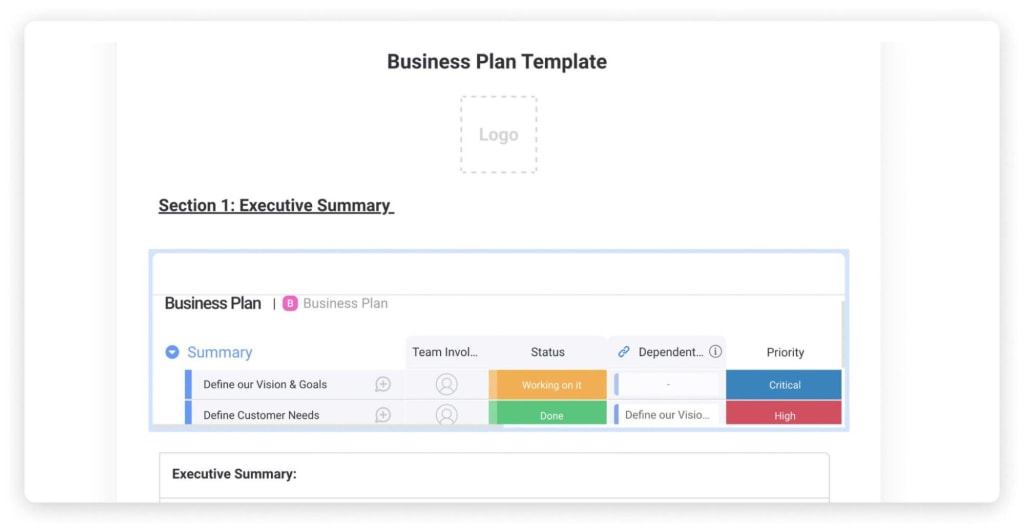
Why use a business plan template?
Since 2019, there’s been a decline in Series A investment, the second stage of startup financing for startups, the first stage for venture capital financing.
All of that is to say; new businesses seeking funding from venture capitalists may struggle more than before to get off the ground. That’s why managing cash runway is essential.
To secure funding, you need to show potential investors that your house (business plan) is in order. A business plan template helps showcase your strategy ideas in a precise and concise manner. But business plan templates aren’t just useful for funding. They have several other benefits, such as:
- Attracting talent: Potential employees take a risk by coming aboard a new company. They want to make sure there is a clear direction.
- Getting everyone on the same page: For companies launching with one or more business partners, the business plan becomes the single source of truth for all parties.
- Achieving clarity on the future: Clarity isn’t just for investors and talent. It’s also helpful and important for employees to understand where the new business will go.
- Providing a more structured planning process: Instead of starting from a blank page and drafting whatever comes to mind first, the template serves as a guide through every section.
- Maintaining consistency: Even if the intent is a single business, you may need marketing or strategy effort plans down the road. A template provides consistency so stakeholders spend less time trying to navigate structure and more time discussing and implementing the plan.
There are dozens of business plan templates out there, each with their own structure and flow. Having an idea of what you need to get across and include in your template will help you stay on track and limit delays.
What are some examples of business plan templates?
Below, we’ve included some examples of business plans that are useful in various scenarios. Most of these come as a template PDF or spreadsheet, which, might get a little limiting, but we’ll get to that later on. Here are a few popular options:
Start-up business plan template
A startup isn’t just a new business. It’s a specific type of new business. A startup generally aims to disrupt the market and owners or founders want to grow as much as possible in a short period of time.
Owners of new small businesses may not want to achieve this type of growth. For instance, a local dog groomer may never want to have more than one or two employees on their team. But startup business plan templates provide a specific structure for disruption and growth.
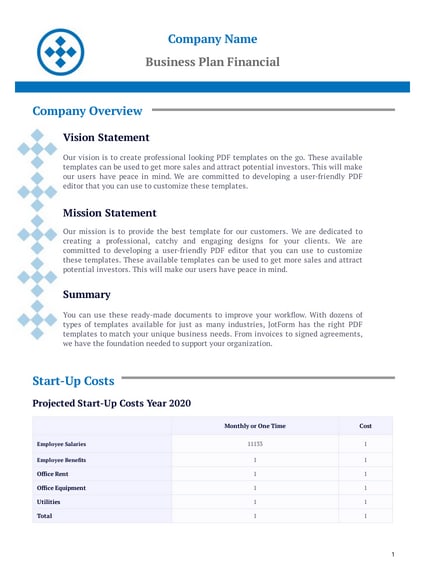
Business growth plan template
A business growth plan template is perfect for existing businesses that want to grow. Often, these template sections compare a starting point to the final growth goals.
Unlike a regular business plan, your existing customers and products are your starting point, as it’s important to consider their needs and wants to retain existing customers and attract new ones. Here’s what this plan could look like:
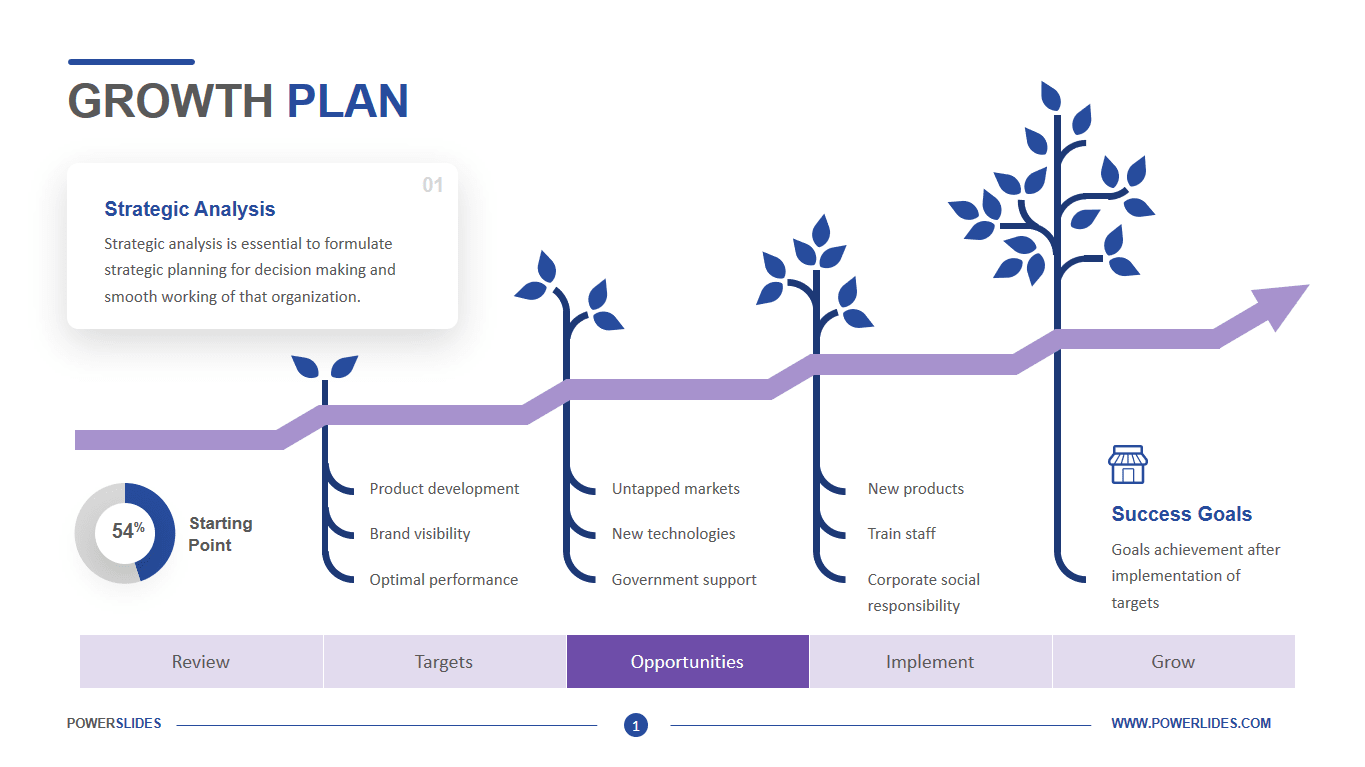
Strategic business plan template
This type of template focuses on high-level company goals and vision. It also includes an implementation plan for the strategy. Businesses at any stage can use a strategic business plan template.
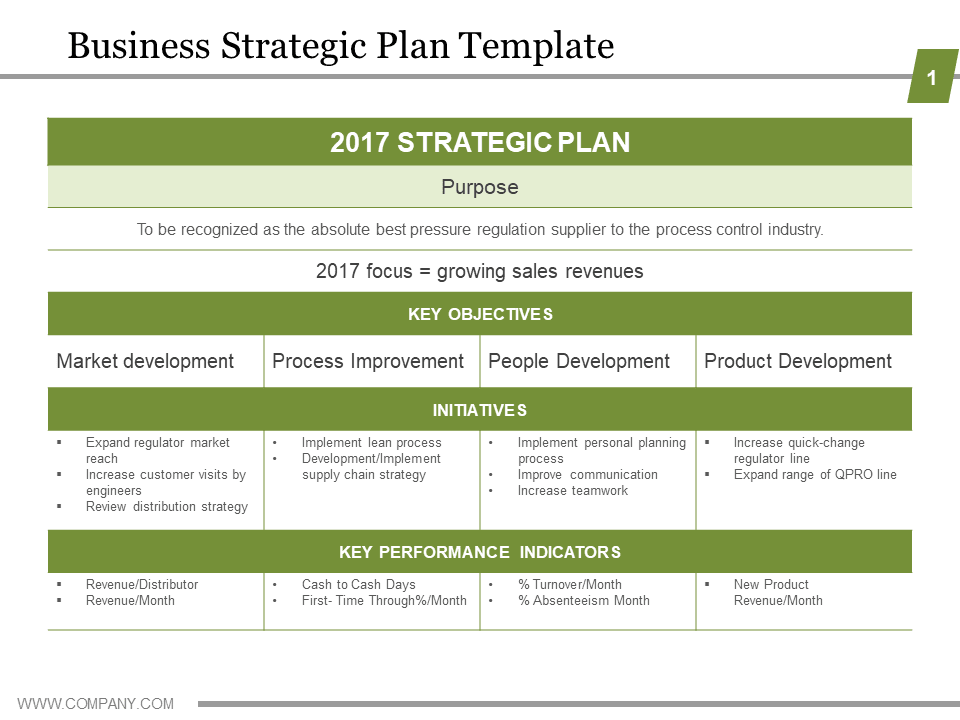
The above templates are all static—which means you can input information, but can’t necessarily collaborate on the plan with coworkers in real time, or connect it to your larger workflows. This is why we created a powerful, yet simple business plan template that can scale with you.
monday.com’s simple business plan template is dynamic
As we mentioned earlier, using a template to plan out business details is helpful for staying organized and focused.
monday.com’s free business plan template allows any subscribed stakeholder to view, comment, or collaborate on the board. All changes are immediately saved and updated.
Instead of everyone working on the plan separately and saving different versions or having to be physically present with all stakeholders to make changes on the spot, monday.com allows you to work independently while still keeping everyone informed of the latest changes.
For instance, if you want to show your business plan board in a specific update or within a certain conversation on another board, you can easily embed the business plan, knowing that it’s always up to date.
To increase efficiency, monday.com has several automations that make it easy to collaborate and work smoothly. Let stakeholders know when you’ve changed a column or a status. Create an automation that reminds everyone of an important date or deadline.
Lastly, monday.com is fully integrated with several tools necessary to run a successful business. That means all of your work and tools live on the same platform, so there is no need to jump from a spreadsheet to a PDF and back to another spreadsheet.
Here’s a glimpse of our business plan template:
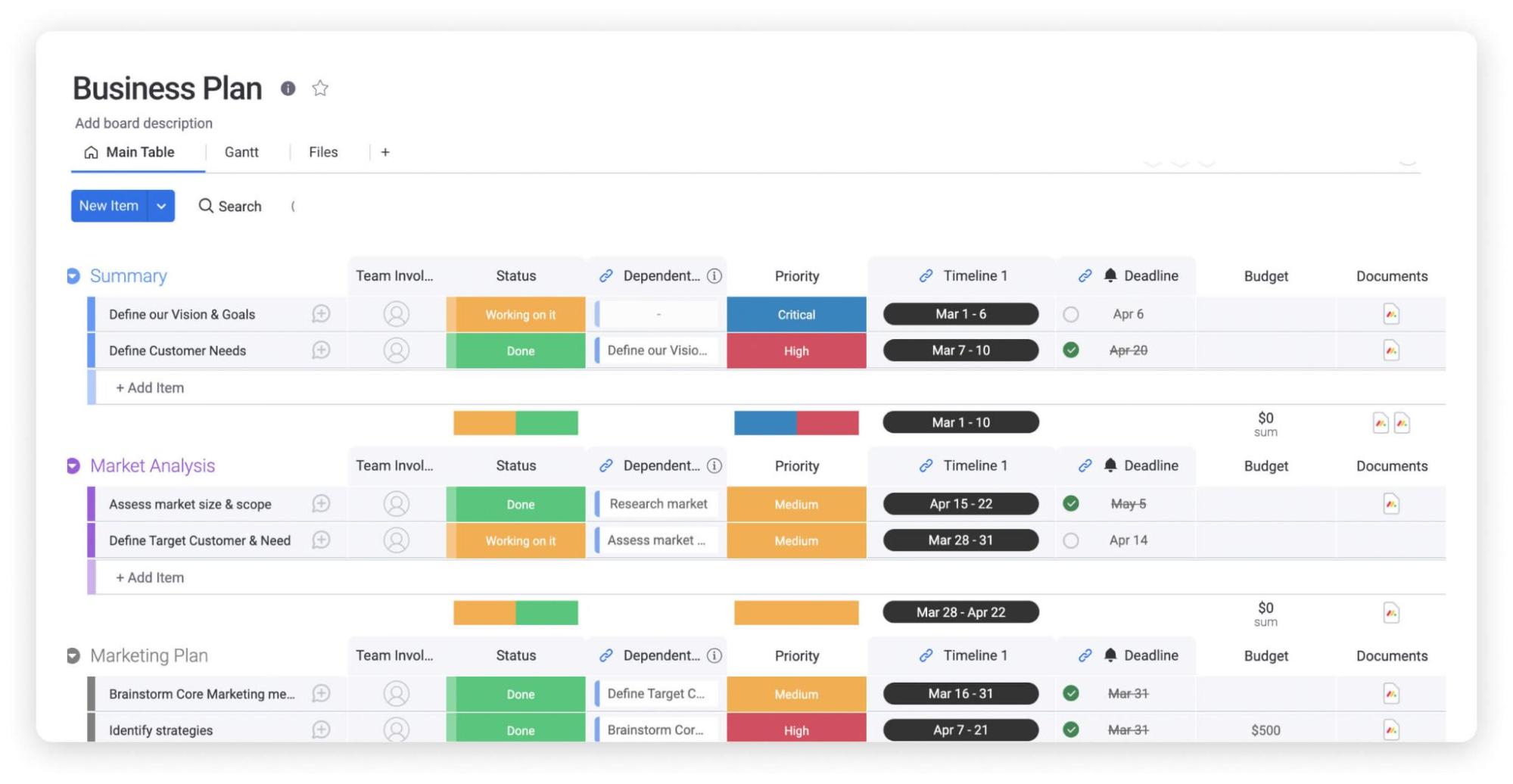
With any strategy though, you may need more than one template. Check out a few additional formats below that complement the business strategy template.
Related templates
When creating a business plan, it may be helpful to include other information on operations or finances. Here’s a short run down on various templates that help you organize that data.
Operations plan template
An operations plan outlines how the team will reach business goals. This template type lays out all the usual moving pieces involved in business operations.
Marketing SWOT analysis template
No marketing SWOT analysis in the business plan? Consider creating one separately. A marketing SWOT analysis template helps outline all the strengths, weaknesses, opportunities, and threats in the marketplace and how the marketing strategy can make the most of this reality.
Financial plan template
Plan the company’s finances to create forecasts and budget accordingly with a financial plan template. A financial plan can be standalone, but it’ll usually be included in a complete business plan template. They can also work on finance requests.
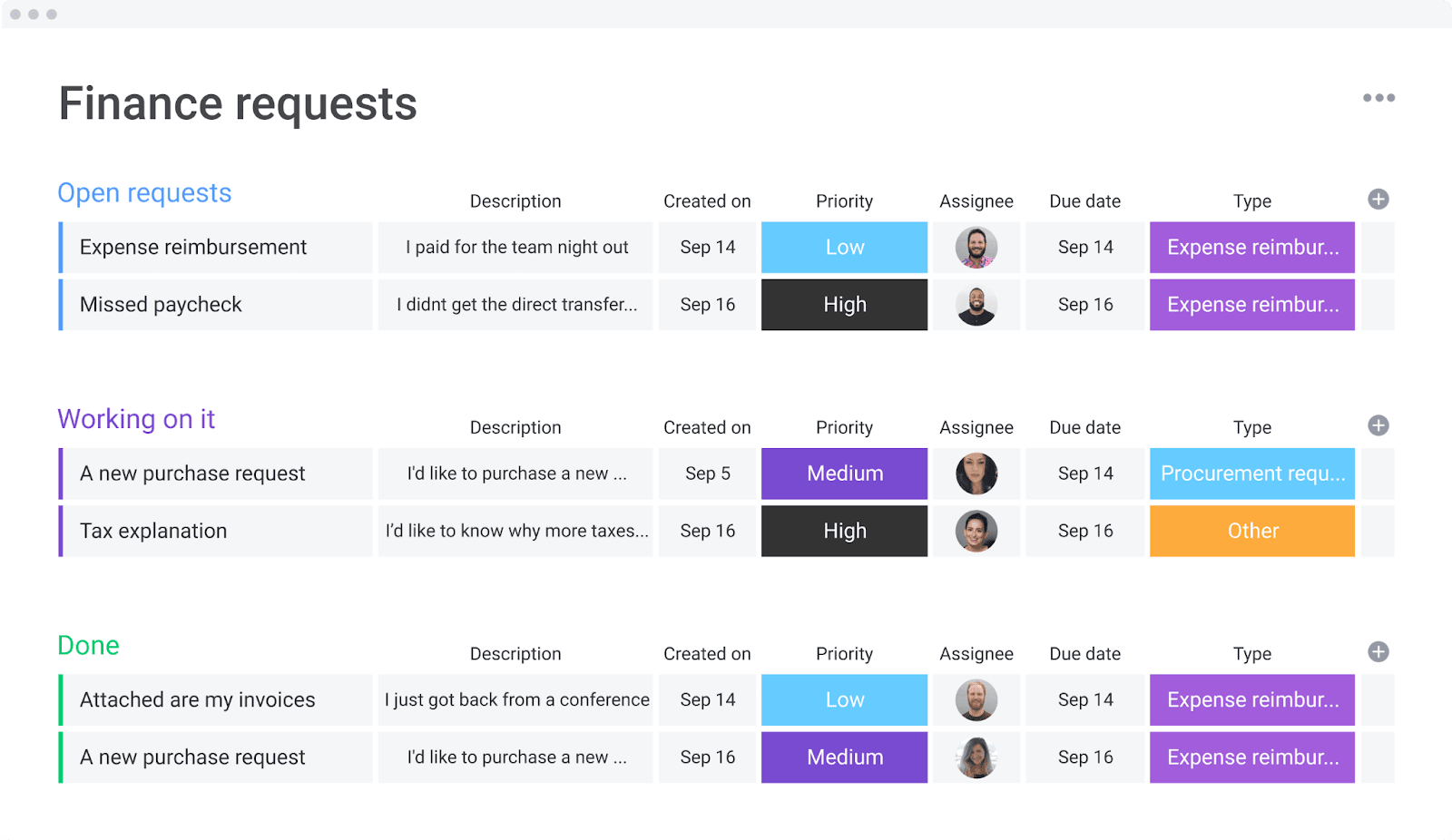
We’ve covered a lot so far. If you still have questions or just want to read more on business plan templates, head to our FAQ below.
FAQs about business plan templates
What are the 7 elements of a business plan?
Every business plan should at least include the following seven elements:
- Executive summary: a brief overview of the company, its mission statement, and why it will succeed.
- Description of the business: a detailed breakdown of what the company will be, what market and customers it’ll target, what problems it solves, and how it will stand out from the competition.
- Products or services: a more granular breakdown of the business’s products or services, what problems they solve (and for whom).
- SWOT analysis: the strengths, weaknesses, opportunities, and threats the business may face. Be sure to include market analysis for the target market.
- Business strategy and implementation: the methods you plan to use to succeed with your business and how you’ll implement them.
- Breakdown of the management team: a description of each member of the management team with a breakdown of what their role will be in the business.
- Financial plans: the business model, financial projections, and how much money will be invested.
How do you write a business plan?
You can create a business plan on monday.com with one click.
Download our template and fill out each of the seven sections above step by step. When finished, share the board with other stakeholders for review and sign off.
What should a simple business plan include?
Apart from the seven core elements, most business plans should include a few more things depending on the business type. Writing a lean business plan? It may not be necessary to have much more than the basics. However, a 10-page business plan may need more details.
If asking for funding, include a section that explains the funding requests. How much funding will be necessary? How will those funds be used? Asking for a loan or selling shares of a future business? The startup business plan can also include a marketing plan within the strategy section.

